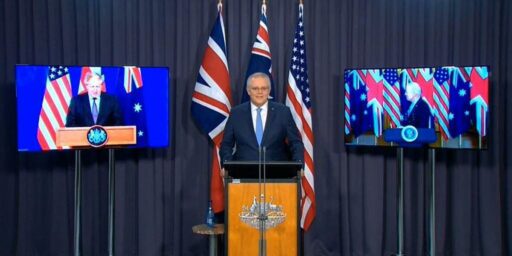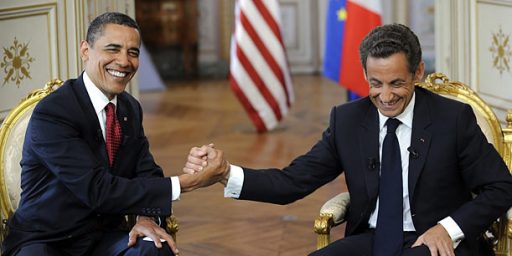Sarkozy: Bombing Iran an Option
French President Nicolas Sarkozy caused quite a stir by raising the specter of bombing Iran to prevent it becoming a nuclear weapon state.
The biggest challenge to the world was the avoidance of conflict between Islam and the West, President Sarkozy told the annual gathering of French ambassadors. Iran was the crossroads of the Middle East’s troubles and its nuclear aims “are without doubt the most serious crisis that weighs today on the international scene”, he said. A nuclear-armed Iran would be unacceptable and the world must continue to tighten sanctions while offering incentives to Tehran to halt weapons development, he said. “This initiative is the only one that can enable us to escape an alternative that I say is catastrophic: the Iranian bomb or the bombing of Iran,” he said. He did not say who would carry out such an attack, which has been suggested by policy experts in Israel and the US.
This rhetoric strikes me as a means of increasing the urgency of the diplomatic process rather touting a preference for military action. I would note, too, that most “policy experts” think bombing Iran would have disastrous consequences; the only question is whether they would be more catastrophic than a nuclear Iran.
The rest of the speech was interesting, too, signaling substantive changes in French foreign policy.
President Sarkozy, the most pro-American French leader for decades, condemned the US invasion of Iraq, but also distanced himself from Mr Chirac’s doctrine of a “multipolar world”, a formula that Washington saw as code for a refusal of European partnership. Where Mr Chirac was careful not to criticise President Putin’s Russia, President Sarkozy said: “Russia is imposing its return on the world scene by using its assets, notably oil and gas, with a certain brutality.”
This is welcome news on several fronts. It simultaneously demonstrates an understanding that cooperation with the United States is essential to solving most of the problems Europe faces while highlighting France’s sovereignty. Sarkozy is not going to be America’s adversary; nor is he our “poodle.” That’s healthy.
And his shot across the bow of the increasingly authoritarian Putin regime is good to see. Getting Russia back on the path to following international norms is vital to head off major problems with a floundering great power.
On Europe, the President seemed to soften his outright hostility to eventual Turkish entry to the Union. He said that France would not block negotiations provided that a high-level “wise men’s group” was appointed to sketch the form that the Union should take. He also demanded that other European nations should contribute more to the Union’s defence to ease the burden on France and Britain.
This is mostly self-interest talking but that’s the nature of international politics. Still, figuring out what to do about widening Europe’s institutions and about the longstanding issues of burden sharing are important. Anything that gets those issues on the table is helpful.





Among the many concerning things about bombing Iran is the prospect that it would incentivize the very behaviors we’re trying to eliminate. I see little way that bombing Iran doesn’t become a commitment to keep bombing Iran indefinitely (or until there’s nothing left to bomb).
Since the Iraqi occupation is also indefinite, why is this a problem?
Big Mac said it best: “Bomb, Bomb, Bomb. Bomb, Bomb Iran!”
Not to mention distracting people from the question of the subsidies that French farmers receive from the EU. Look! There’s Halley’s Comet!
What’s refreshing about Sarkozy so far is not that he’s still motivated by France’s particular self-interest instead of gushy good feelings for the U.S. I’m perfectly delighted for France to act in its own long-term national self-interest.
What’s been so frustrating has been the prior regime’s persistent inability to recognize France’s longterm national self-interest, which is not served by a nuclear-weapon-armed Iran any more than America’s is.